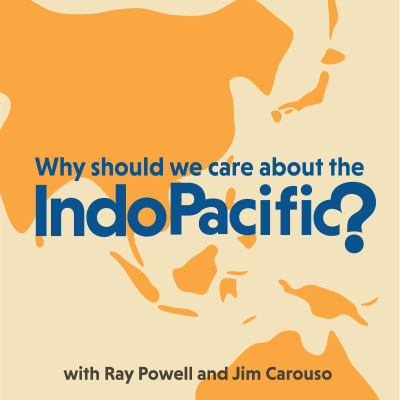
Why Should We Care About the Indo-Pacific?
inglés
Actualidad y política
Empieza 7 días de prueba
$99 / mes después de la prueba.Cancela cuando quieras.
- 20 horas de audiolibros al mes
- Podcasts solo en Podimo
- Podcast gratuitos
Acerca de Why Should We Care About the Indo-Pacific?
Chart the world's new strategic crossroads. Join co-hosts Ray Powell, a 35-year U.S. Air Force veteran and Director of the celebrated SeaLight maritime transparency project, and Jim Carouso, a senior U.S. diplomat and strategic advisor, for your essential weekly briefing on the Indo-Pacific. Drawing on decades of on-the-ground military and diplomatic experience, they deliver unparalleled insights into the forces shaping the 21st century.From the U.S.-China strategic competition to the flashpoints of the South China Sea and Taiwan Strait, we cut through the noise with practical, practitioner-focused analysis. Each episode goes deep on the region's most critical geopolitical, economic and security issues.We bring you conversations with the leaders and experts shaping policy, featuring some of the world's most influential voices, including:Senior government officials and ambassadorsDefense secretaries, national security advisors and four-star military officersLegislators and top regional specialistsC-suite business leadersThis podcast is your indispensable resource for understanding the complexities of alliances and regional groupings like AUKUS, ASEAN and the Quad; the strategic shifts of major powers like the U.S., China, Japan and India; and emerging challenges from economic statecraft to regional security.If you are a foreign policy professional, business leader, scholar, or a citizen seeking to understand the dynamics of global power, this podcast provides the context you need.Subscribe now on Apple Podcasts, Spotify, YouTube or your favorite platform.Produced by Ian Ellis-Jones and IEJ Media. Sponsored by BowerGroupAsia, helping clients navigate the world’s most complex and dynamic markets.
Todos los episodios
138 episodiosWhy Should We Care if Chinese Naval Flotillas Are Now Patrolling the Pacific Islands? | With Ambassador Laura Stone
In December 2025, a four-ship People’s Liberation Army Navy task group - including an amphibious assault ship capable of carrying 1,000 Marines and 30 helicopters - tracked southeast through the Western Pacific, passing through waters near Palau, Micronesia, and the Marshall Islands. Australia scrambled surveillance aircraft. Pacific Island leaders said almost nothing publicly. Most of the world barely noticed. Our guest noticed - because she was there. Ambassador Laura Stone just retired as the US Ambassador to the Republic of the Marshall Islands, capping a distinguished Foreign Service career that included multiple tours in Beijing and serving as Acting Deputy Assistant Secretary of State for China. She joins hosts Ray Powell and Jim Carouso to explain why this naval activity matters far more than the headlines suggest. In this episode: What is China’s “second island cloud” strategy, and why does the Marshall Islands sit at its center? What is the Compact of Free Association, and why does it make the Marshall Islands far more than just a remote atoll? What is Kwajalein Atoll, and why should you Google it right now? How is China using economic influence, bribery, and Belt and Road investment to gain a foothold in the Pacific - and what’s working (and not working) in the US response? What does the gutting of USAID mean for the Pacific Islands? And what does the nuclear legacy of US atomic testing still mean for Marshallese people today? Ambassador Stone also paints a frank picture of the Marshall Islands’ future - a country losing 3–5% of its population per year to outward migration, sitting just six feet above sea level, facing an existential climate threat that Washington is no longer prioritizing. 👉 Follow Ambassador Laura Stone on LinkedIn [https://www.linkedin.com/in/laura-stone-06b160266/] 👉 Follow us on X, @IndoPacPodcast [https://x.com/IndoPacPodcast], LinkedIn [https://www.linkedin.com/company/why-should-we-care-about-the-indo-pacific/], or Facebook [https://www.facebook.com/IndoPacPodcast] 👉 Follow Ray Powell on X, @GordianKnotRay [https://x.com/GordianKnotRay], or LinkedIn [https://www.linkedin.com/in/raymondpowell/], or check out his maritime transparency work at SeaLight [https://www.sealight.live/] 👉 Follow Jim Carouso on LinkedIn [https://www.linkedin.com/in/james-carouso-baa31a9/] 👉 Sponsored by BowerGroupAsia [https://bowergroupasia.com/], a strategic advisory firm that specializes in the Indo-Pacific
Why Should We Care if the U.S. Supreme Court Just Struck Down Trump’s Tariffs? | with Bill Reinsch and Nydia Ngiow
On February 20th, the U.S. Supreme Court ruled that the International Emergency Economic Powers Act (IEEPA) does not authorize President Donald Trump to impose tariffs - a landmark decision that immediately scrambled U.S. trade policy and sent governments and businesses across the Indo-Pacific into a scramble to figure out what it means for them. Co-hosts Ray Powell and Jim Carouso are joined by two of the sharpest minds in U.S. trade and Asia-Pacific economic policy: Bill Reinsch, Senior Adviser at the Center for Strategic and International Studies and co-host of the Trade Guys podcast, and Nydia Ngiow [https://bowergroupasia.com/teams/profiles/nydia-ngiow/], Managing Director for Global Trade and Economics at BowerGroupAsia in Singapore. In Episode 132 we break down: • What IEEPA is, how it became a tariff weapon, and why the Court said “no” • Trump’s immediate Plan B - a 15% global tariff under Section 122 of the Trade Act of 1974, and why that will almost certainly be challenged in court too • What Section 301, Section 232, and other alternative trade tools mean for countries in the region - and why they may be slower, narrower, and harder to wield • Whether countries like Indonesia, Malaysia, and Cambodia that negotiated trade deals under the IEEPA tariff threat got a raw deal - and what happens to those agreements now • The potential for domestic political backlash against leaders seen as having made too many concessions to Washington • Why the ruling may not have handcuffed Trump as much as the headlines suggest • And what the real-world economic impact of tariffs has - and hasn’t - been over the past year If you follow U.S.-China trade tensions, Indo-Pacific economics and geopolitics, or global supply chains, this episode is essential listening. 👉 Follow us on X, @IndoPacPodcast [https://x.com/IndoPacPodcast], LinkedIn [https://www.linkedin.com/company/why-should-we-care-about-the-indo-pacific/], or Facebook [https://www.facebook.com/IndoPacPodcast] 👉 Follow Ray Powell on X, @GordianKnotRay [https://x.com/GordianKnotRay], or LinkedIn [https://www.linkedin.com/in/raymondpowell/], or check out his maritime transparency work at SeaLight [https://www.sealight.live/] 👉 Follow Jim Carouso on LinkedIn [https://www.linkedin.com/in/james-carouso-baa31a9/] 👉 Sponsored by BowerGroupAsia [https://bowergroupasia.com/], a strategic advisory firm that specializes in the Indo-Pacific
Why Should We Care About Myanmar's (Sham) Elections? | with Ambassador Scot Marciel
Myanmar just held its latest round of so-called elections - but the military's proxy party won over 85% of seats after banning the country's most popular opposition party and imprisoning its leaders, including Nobel laureate Aung San Suu Kyi. Voting couldn't even take place across large portions of the country because resistance forces control the territory. So why do these sham elections matter to the rest of the world? In this episode, hosts Ray Powell and Jim Carouso sit down with retired three-time U.S. Ambassador and author Scot Marciel to unpack what these elections really mean, and why the stakes reach far beyond Southeast Asia. Myanmar has become the world's largest source of methamphetamines and a booming hub for cyber scam operations that bilk victims worldwide out of billions of dollars annually. China is simultaneously deepening its strategic footprint in the country, building ports and pipelines from its southern provinces to the Indian Ocean - a critical geopolitical waterway - while Chinese companies extract rare earth minerals from Myanmar's north that barely benefit the country's own people. Ambassador Marciel explains why the military held elections at all - not out of any democratic impulse, but to manufacture legitimacy and give countries like China, India, and Russia a convenient excuse to re-engage. He also breaks down why ASEAN, despite refusing to certify the results, remains largely paralyzed: constrained by its own consensus rules and non-interference norms, while watching China's influence expand with little competition. On the outlook, Marciel is candid: there is no magic bullet, no easy diplomatic compromise, and the most likely near-term scenario is more of the same - a grinding civil war fading into the background while a fatigued world looks away. But he closes with one reason for hope: the extraordinary, unbreakable resilience of the Myanmar people themselves. 👉 Read Ambassador Marciel’s book, Imperfect Partners: The United States and Southeast Asia [https://www.amazon.com/Imperfect-Partners-Scot-Marciel/dp/1538178958] 👉 Follow us on X, @IndoPacPodcast [https://x.com/IndoPacPodcast], on LinkedIn [https://www.linkedin.com/company/why-should-we-care-about-the-indo-pacific/] or on Facebook [https://www.facebook.com/IndoPacPodcast] 👉 Follow Ray Powell on X, @GordianKnotRay [https://x.com/GordianKnotRay], or LinkedIn [https://www.linkedin.com/in/raymondpowell/], or check out his maritime transparency work at SeaLight [https://www.sealight.live/] 👉 Follow Jim Carouso on LinkedIn [https://www.linkedin.com/in/james-carouso-baa31a9/] 👉 Sponsored by BowerGroupAsia [https://bowergroupasia.com/], a strategic advisory firm that specializes in the Indo-Pacific
Why Should We Care About Australia’s Fight Against China’s Political Warfare? | with Clive Hamilton
In Ep. 130, Ray and Jim sit down with Clive Hamilton, one of the world's leading experts on Chinese Communist Party political influence operations. Hamilton is the author of the groundbreaking books Silent Invasion: China's Influence in Australia and Hidden Hand: Exposing How the Chinese Communist Party Is Reshaping the World. In this compelling podcast, Hamilton shares the dramatic story behind Silent Invasion - a book so controversial that three major Australian publishers rejected it for fear of Beijing's retaliation. He reveals the personal costs of exposing CCP interference, from cyber-attacks that destroyed his laptop to being banned from China and labeled a "black hand" by Beijing's official media. Hamilton breaks down how the CCP's United Front Work Department orchestrates political warfare through elite capture, diaspora mobilization, and covert influence in universities, media, and politics. He explains how Australia's 2018 counter-interference laws and Foreign Influence Transparency Scheme (FITS) emerged as a democratic defense - and evaluates their real-world effectiveness, including enforcement challenges and necessary reforms. The conversation explores critical lessons for the Philippines and other Indo-Pacific nations facing similar CCP pressure, especially regarding South China Sea tensions. Hamilton offers practical advice on designing swift, effective counter-interference legislation while protecting diaspora communities from discrimination. This is essential listening for anyone interested in China’s strategy, foreign influence operations, national security, democratic resilience, and Indo-Pacific geopolitics. 👉 Follow Clive Hamilton on LinkedIn [https://www.linkedin.com/in/clive-hamilton-19830a248/] 👉 Follow us on X, @IndoPacPodcast [https://x.com/IndoPacPodcast], on LinkedIn [https://www.linkedin.com/company/why-should-we-care-about-the-indo-pacific/] or on Facebook [https://www.facebook.com/IndoPacPodcast] 👉 Follow Ray Powell on X, @GordianKnotRay [https://x.com/GordianKnotRay], or LinkedIn [https://www.linkedin.com/in/raymondpowell/], or check out his maritime transparency work at SeaLight [https://www.sealight.live/] 👉 Follow Jim Carouso on LinkedIn [https://www.linkedin.com/in/james-carouso-baa31a9/] 👉 Sponsored by BowerGroupAsia [https://bowergroupasia.com/], a strategic advisory firm that specializes in the Indo-Pacific
Why Should We Care About Japan’s Snap-Election Landslide? | with Jake Schlesinger
Japan’s February 8th snap election delivered a historic result: Prime Minister Sanae Takaichi’s ruling Liberal Democratic Party (LDP) secured a rare two‑thirds supermajority in the powerful lower house, giving her the strongest mandate any postwar leader has enjoyed to date. That will sharply increase what she can do on economic policy, defense readiness, and how Japan responds to pressures from both the US and China. Jake Schlesinger - President and CEO of the US‑Japan Foundation and a longtime Japan-watcher - joins the show to explain why this election was a potential turning point in a political system often seen as stable to the point of stagnation. He argues that while Japan’s politics have frequently been defined by weak and short-lived prime ministers and cautious consensus, this vote creates the conditions for unusually decisive leadership. Schlesinger describes an electorate focused less on the LDP’s history of political ethics controversies and more on daily economic pressure combined with a sense that Takaichi herself represents a fresh face. The episode unpacks how Japanese voters can be skeptical about big fiscal promises while still rewarding the leader who seems most willing to speak directly to pocketbook issues like inflation, wages, and household strain. The conversation shifts to geopolitics, as Schlesinger highlights how China’s recent threats and coercive signaling appeared to backfire, strengthening public support for a leader who stands up rather than backing down. He frames this as a meaningful change in Japan’s public mood: a country once inclined to avoid antagonizing neighbors is increasingly prepared to accept friction if it’s tied to national security - particularly around Taiwan, a Chinese invasion of which Takaichi has warned would pose an existential crisis for Japan. The episode also examines what this election mandate could mean for the US‑Japan alliance. While people-to-people ties remain strong, Schlesinger notes that Tokyo is navigating a complex era of “America-First” politics - simultaneously hugging the US closer while hedging its bets with other regional partners like Australia, India, the Philippines, and South Korea. Finally, the discussion touches on constitutional constraints on Japan’s military and whether this supermajority could finally open the door to a formal revision. 👉 Learn more about the US-Japan Foundation at its web site [https://us-jf.org/en/], on LinkedIn [https://www.linkedin.com/company/united-states-japan-foundation/], on X at @usjf_ [https://x.com/usjf_] or on Facebook [https://www.facebook.com/UnitedStatesJapanFoundation/] 👉 Follow us on X, @IndoPacPodcast [https://x.com/IndoPacPodcast], LinkedIn [https://www.linkedin.com/company/why-should-we-care-about-the-indo-pacific/], or Facebook [https://www.facebook.com/IndoPacPodcast] 👉 Follow Ray Powell on X, @GordianKnotRay [https://x.com/GordianKnotRay], or LinkedIn [https://www.linkedin.com/in/raymondpowell/] 👉 Follow Jim Carouso on LinkedIn [https://www.linkedin.com/in/james-carouso-baa31a9/] 👉 Sponsored by BowerGroupAsia [https://bowergroupasia.com/], a strategic advisory firm that specializes in the Indo-Pacific
Elige tu suscripción
Premium
20 horas de audiolibros
Podcasts solo en Podimo
Podcast gratuitos
Cancela cuando quieras
Empieza 7 días de prueba
Después $99 / mes
Empieza 7 días de prueba. $99 / mes después de la prueba. Cancela cuando quieras.





































